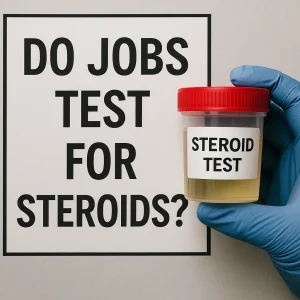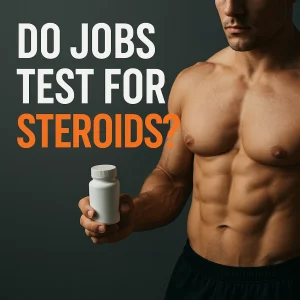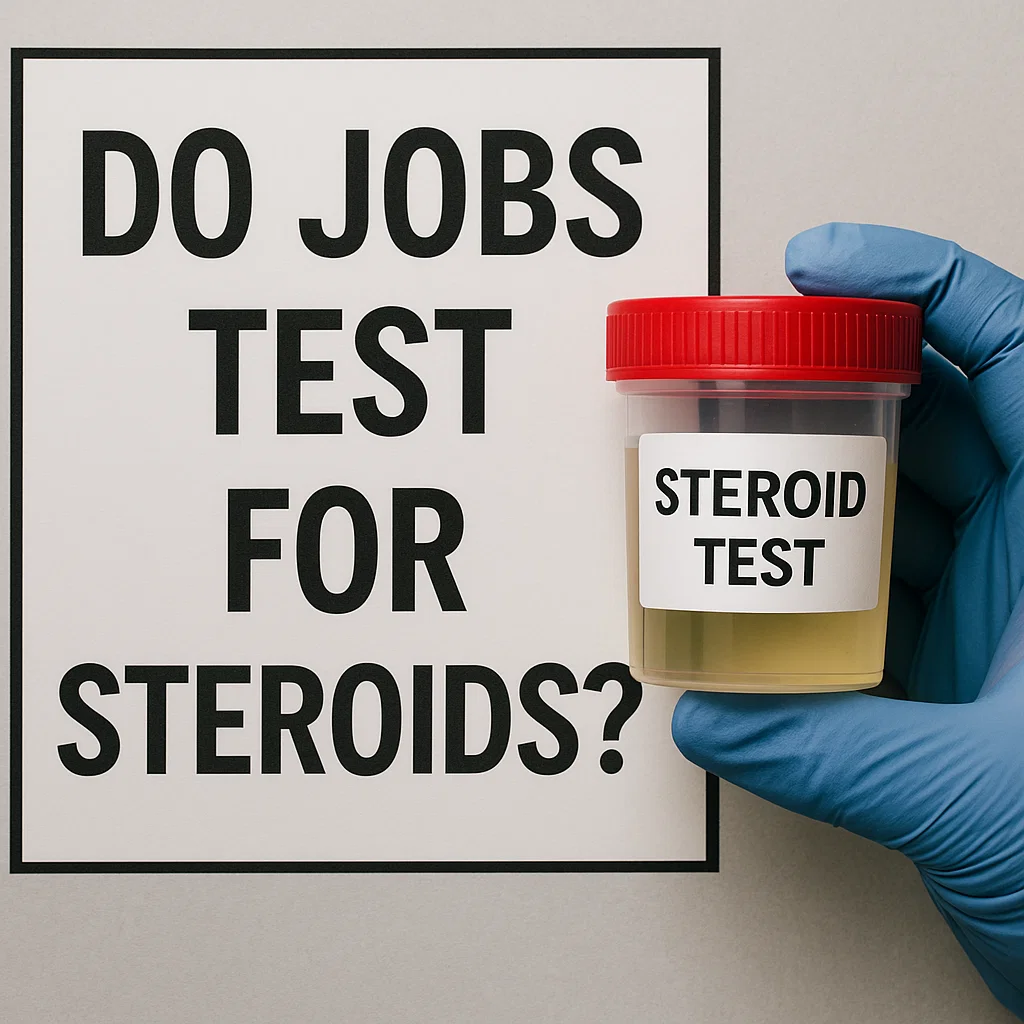Do Jobs Test for Steroids?
Short answer: Most regular employers do not test for anabolic steroids in standard pre-employment or workplace drug screens. However, there are important exceptions—especially in safety-sensitive roles, elite sports, and organizations with enhanced testing policies. This guide explains when steroid testing happens, what tests are used, and how policies differ by industry so you can understand the landscape before you apply or accept a role.
Looking for straight-forward information on performance compounds? Explore quality, lab-tested products and education with Forged Pharma.
What Employers Usually Test For
Typical panels (5-panel, 7-panel, 10-panel) focus on substances linked to workplace impairment and public safety (e.g., THC, cocaine, amphetamines, opiates, PCP, sometimes benzodiazepines or barbiturates). Anabolic-androgenic steroids (AAS) are not part of these basic panels.
Why not?
-
Steroid testing is specialized and more expensive.
-
AAS are not acute impairants like alcohol or many illicit drugs.
-
Many workplaces focus on risk-of-impairment rather than physique-oriented compounds.
That said, any employer can add tests to a panel. Some do.

Workplace screening: when do employers test for anabolic steroids?
When Employers Do Test for Steroids
-
Professional and Collegiate Sports
-
Leagues, athletic commissions, and anti-doping bodies (e.g., WADA-aligned programs) routinely test for a wide range of AAS and related agents.
-
Testing can be urine and/or blood, often random, with strict sanctions for positives.
-
-
Public Safety & Military-Adjacent Roles
-
Some departments (certain police, corrections, or specialized military units) may authorize expanded panels when policy makers believe steroids could affect decision-making, aggression, or health risk.
-
Policies vary by jurisdiction and union contract; read the written policy for the unit you’re considering.
-
-
Safety-Sensitive Private Industry
-
High-risk sectors like aviation, heavy equipment, energy, and transport sometimes use enhanced screening protocols. Steroid testing is less common here than in sports, but not unheard of—particularly after incidents, on a reasonable-suspicion basis, or during fitness-for-duty evaluations.
-
-
Jobs With Explicit Fitness Standards
-
Roles that require physique/strength benchmarks (e.g., certain security or specialized contractor roles) may include policy language on AAS. Actual testing frequency varies.
-
What a Steroid Test Looks Like
Urine tests (immunoassay + GC/MS confirmation) are the most common laboratory approach for AAS. Some programs also use blood tests or biological passports (in sport) to detect markers over time. Tests can look for:
-
Parent compounds (e.g., oxandrolone, stanozolol)
-
Metabolites unique to each steroid
-
Ratios/biomarkers (e.g., T/E testosterone-to-epitestosterone ratios) that signal exogenous use
Because each compound has different metabolites and detection windows, comprehensive testing requires targeted panels—which is why it’s rarer (and costlier) outside of sport.
Detection Windows (High-Level Overview Only)
Detection depends on compound, dose, frequency, ester length, individual metabolism, and lab method. Orals often have shorter windows than long-ester injectables, but advanced labs can find metabolites for weeks to months for some AAS. Don’t assume one universal timeline; there isn’t one.
Pre-Employment vs. Ongoing/Random Testing
-
Pre-employment: Standard corporate screens seldom include AAS unless the job posting or policy explicitly says so.
-
Probationary/Periodic: Some employers add extra testing during a probationary period or after return-to-work agreements.
-
Reasonable Suspicion or Post-Incident: If a policy allows it, an employer might order an expanded panel after an incident or credible report—potentially including AAS.
-
Random Testing Pools: Common in sports and certain safety-sensitive operations. Whether AAS are included depends entirely on the written policy.
What About Prescription Steroids?
Two very different categories are often confused:
-
Anabolic-androgenic steroids (AAS) like testosterone cypionate, oxandrolone (Anavar), or stanozolol (Winstrol), typically controlled substances and frequently regulated under performance-enhancement policies.
-
Corticosteroids (e.g., prednisone) used for inflammation and immune conditions. These are not the same as AAS. Some organizations require Therapeutic Use Exemptions or a letter from a physician if a corticosteroid could appear on a panel or conflict with competition rules. Always disclose per policy and law.
Canada vs. United States vs. Elsewhere
Workplace testing practices are shaped by local laws, unions, accreditation bodies, and insurance requirements. In both Canada and the U.S., general-population employers rarely test specifically for AAS unless the role is safety-sensitive or the organization has enhanced policies. Sports and certain public-safety organizations are the major exceptions. When in doubt, ask HR for the exact panel used.
Red Flags and Green Lights in Job Postings & Policies
Clues that steroids might be on the table:
-
The ad or employee handbook references “performance-enhancing drugs,” “anabolic steroids,” “AAS,” or “expanded testing.”
-
The role is explicitly safety-sensitive (aviation, rail, oil & gas, heavy equipment) with fitness-for-duty language.
-
The employer cites alignment with anti-doping standards (common in sport).
Clues that AAS are unlikely to be tested:
-
Standard 5- or 10-panel terminology with no mention of expanded panels
-
Office-based or non-safety-sensitive roles
-
No policy language on PEDs beyond alcohol/illicit drugs
If you need clarity, it’s reasonable—and professional—to ask HR:
“Could you confirm the substances included in the pre-employment and random drug panels for this role?”
Privacy, Consent, and Your Rights
Drug testing involves sensitive health information. Reputable employers use accredited labs and chain-of-custody procedures and disclose:
-
What is tested
-
When and why testing occurs
-
How results are handled and who can see them
-
What happens after a positive, including re-tests or medical review
You always have the right to review written policy and, in many jurisdictions, to challenge results through a medical review officer (MRO) or a second confirmation test.

Understanding steroid testing in hiring and on the job.
Key Takeaways
-
Most jobs do not test for steroids on standard panels.
-
They can if policy specifies it—especially in sports, some public-safety roles, and certain safety-sensitive industries.
-
Testing methods for AAS are specialized and vary by compound; detection windows are not one-size-fits-all.
-
Read the policy for your specific role and ask HR for the named panel.
-
If you use any prescription therapies, consult your doctor and follow disclosure rules where required.
For trusted education and access to lab-tested products with discreet Canadian shipping, visit Forged Pharma.
FAQ
Do most employers include steroids in a standard drug test?
No. Typical workplace panels do not include anabolic steroids. Exceptions exist when the policy explicitly adds AAS.
Which industries are most likely to test for steroids?
Sports organizations lead by far. Some public-safety and safety-sensitive employers may include AAS in expanded panels.
Can an employer add steroid testing later?
Yes—if permitted by policy or collective agreement, employers may implement reasonable-suspicion, post-incident, or random expanded testing.
Will a prescription for testosterone matter?
Policies differ. A legitimate prescription may be reviewed by a medical review officer. Always follow disclosure requirements and workplace rules.
Where can I find quality information and products in Canada?
Start with Forged Pharma for transparent sourcing and discreet, domestic shipping.



Leave a comment
Your email address will not be published. Required fields are marked *
You must be logged in to post a comment.